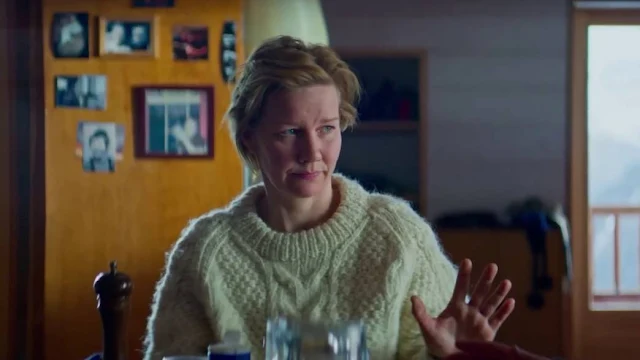There's still vitality in courtroom dramas, especially when they delve into marital complexities, as demonstrated in Justine Triet’s “Anatomy of a Fall.” What initially appears as a conventional mystery transforms into an exploration of a distinct type of descent – not just the literal fall at its core, but the unraveling of a partnership over years marked by resentments and betrayals. Sandra Hüller delivers a remarkable performance, arguably the best of the year, portraying a woman thrust into a nightmarish scenario when a French court accuses her of murdering her husband.
This film claimed the prestigious Palme d’Or at the Cannes Film Festival, and rightfully so. Beyond its mystery elements, it evolves into a comprehensive scrutiny of a marriage from every angle, underlining the notion that understanding others completely is an elusive feat. Though daring and at times veering into a slightly cold and self-indulgent territory due to its extended runtime, “Anatomy of a Fall” culminates in a sequence of scenes that resonate powerfully, hitting the audience like a well-timed punch. It captures those moments when a conflict with a partner escalates just a bit too far.
Hüller takes on the role of Sandra, initially introduced through an interview where she discusses her life as a renowned author. Triet’s film intriguingly plays with the concept that writers inherently draw from those around them, adding a layer of significance to the protagonist's profession (and it's worth noting the clever coincidence that the lead couple shares the names of their real-life performers).
As the interview unfolds, taking on an arguably flirtatious tone, the serene atmosphere of their remote, snow-clad cabin in the French Alps is disrupted by blaring music from above. Sandra's husband, Samuel (played by Samuel Theis), cranks up an instrumental rendition of 50 Cent’s “P.I.M.P.,” of all things, on repeat, growing louder with each cycle. His aggressive attempt to derail the interview proves successful as the interviewer departs, leaving an awkward aftermath.
Related : Fool Me Once Review
With their son Daniel (Milo Machado Graner) taking the family dog Snoop for a prolonged walk during this chaos, upon his return, he discovers Samuel in the snow with a bloody wound to his head. The mystery deepens – did he accidentally fall from the attic where he was working? Was it a deliberate leap? Or could he have been pushed?
Over the next two-and-a-half hours, "Anatomy of a Fall" meticulously chronicles the investigation and trial surrounding Samuel’s untimely demise. Every decision made, not only on that fateful day but throughout their marriage, undergoes intense scrutiny from individuals who have never crossed paths with Sandra, Samuel, or Daniel. The film masterfully unveils the overwhelming personal baggage that surfaces when a death is deemed inconclusive.
Samuel’s therapist takes the stand, asserting that he wasn't suicidal, yet acknowledging the limited perspective gained from seeing only what Samuel chose to reveal. The interviewer, a virtual stranger, is called upon to comment on the mental state of a woman she just met. What insight does she truly possess about their lives? The portrayal of a person’s mental state remains partial, and at times, it feels as though Sandra’s very personality is under trial. Nevertheless, some compelling evidence suggests her potential responsibility.
While it might seem that Triet is playing a mystery game with "Anatomy of a Fall," the film transcends manipulation or withholding tactics. In fact, it thrives when shedding some of the gamesmanship that a lesser filmmaker might have resorted to in telling this story. While there is indeed a puzzle to be solved, the essence lies beyond mere resolution. Triet delves into the intricacies of how couples communicate, or more often fail to do so, and the repercussions of such failures. The choice of English as the common ground for Sandra and Samuel, both non-native speakers, and Daniel's impaired eyesight resulting from an accident underscore a larger theme — the inherent difficulty in fully understanding and seeing each other.
Hüller delivers a stunning performance, portraying Sandra with a nuanced depiction of motives and half-buried skeletons kept largely internal. It's evident that every facet of this character has been meticulously considered, resulting in a calibrated, lived-in performance where the backstory resonates in almost every scene. The journey of a woman like Sandra, suddenly confronted with her husband's death and her entire life on trial, is portrayed without resorting to melodrama. The film's emotional climax, set against an intense flashback, is shattering in its realism. Amidst the vast potential for an inferior version of “Anatomy of a Fall” that leans on overcooked melodrama and mystery, this one stands out for its focus on character. The trust between Triet and Hüller grounds every scene, holding the narrative together.
At times, the 151-minute runtime may feel longer than necessary, but it contributes to the film's literary quality, transcending traditional genre storytelling. The extended duration allows the audience to truly sense the cold atmosphere within Sandra and Samuel’s home — a chilling combination of the snow outside and the warmth drained from the family. The film explores profound questions about overcoming resentment, navigating infidelity, and grappling with trust issues in relationships. “Anatomy of a Fall” doesn't shy away from delving into the complexities of its characters, yet its most potent moments arise from an acknowledgment that it doesn't possess all the answers.
This review was crafted during the Toronto International Film Festival, and “Anatomy of a Fall” is set to open on October 13th.
Tags:
Thriller Movie

